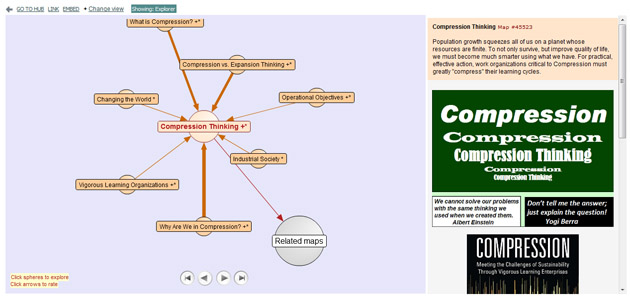Click here to view the new Explorer visualization of the Compression Map shown above, which opens in a different page.
Using your mouse, hover over each sphere below for a brief explanation. Clicking on a sphere opens up more spheres; and you can work your way back to the center again. Clicking the “Related Maps” sphere takes you to other maps, whereas this map centers on “Compression Thinking.” Clicking on the “TV icon” fills your screen with the map. Clicking the icon with the green cross may open more detail about each one.
Some Key Compression Points to Look for:
- Centuries of physical economic expansion cannot continue many more decades.
- Compression = physical resources limits; population crowding; do more using less; learn much faster.
- Atmospheric CO2 is only one of thousands of environmental risks; new ones keep emerging.
- Compression is operational – what we must do.
- Technology is not enough. Changing our patterns of thinking and behavior is the hard part.
- “Lean thinking” is barely a start; Compression is a much bigger challenge.
- Use physical measures to see what we do, financial ones are too misleading.
- Work organizations are key to human survival and quality of life.
- Expansionary era concepts of business and economics are obsolete.
- Even our definitions of efficiency are inadequate.
- Base our most important decisions on a “process theory of value;” market theory is self-deceptive.
- The first challenge — trying to pull such diverse thinking together.
Visit the new Compression Forum to brainstorm with others about methods for applying Compression Thinking and/or share the results of your Compression Thinking experimentation.

